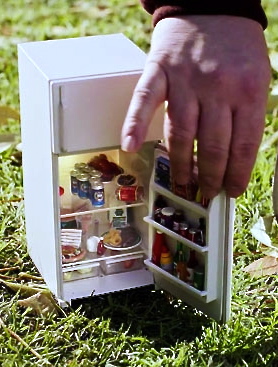No. 54: un p’tit… / une p’tite…
Now that I’m more in tune with the French (literally, I can finally understand a lot of what the French are saying to me…hurrah!), I keep hearing “un p’tit / une p’tite so and so”… Short, of course for un petit/ une petite.
While I, with my VERY literal grasp on français, find it an adorable habit to make nouns smaller than they actually are by prefacing them with the word “petite”, mes amies françaises have a slightly different take on it.
They seem to be of two minds, or perhaps I should say, they can see both a positive side and a negative side to their compatriots’ linguistic addiction to le p’tit mot “petit(e)”.
On the positive side, when used among close friends, or people you’d like to be close friends with, the word petite, indicates a “closeness” and not a smaller size. For example, when you invite a few good friends to “une p’tite soirée” (a party), you are implying that it will be a warm gathering among close friends. Un p’tit café with a friend implies an intimate catching up over coffee (not a tiny cup of Joe), where as an invitation to have un café with an acquaintance or colleague, is more in line with the business end of things.
Among friends you could share une p’tite bière, (beer), une p’tite blanquette de veau, (veal stew), un petit dîner (dinner), or un p’tit verre (a glass of wine). You could go for un p’tit ciné (a trip to the movies), on une p’tite ballade (walk), and, of course, un p’tit week-end, which the French adore. None of these things are necessarily reduced in size or length.
As a form of politeness you could ask your prof une p’tite question, or the cashier at the grocery store might ask for un p’tit signiture for your credit card bill. Both of which imply a certain reticence for disturbing you with a request.
But according to my French friends, the addition of the word petite also has a negative implication. They say that the word petite can be used to negate something that was actually a very pleasurable experience… lowering the bar and the value of a really enjoyable moment. Much as the French will almost always reply, when ask about their opinion of something, that it was: “pas mal” (not bad), rather than daring to articulate that is was pretty darn great, the word petite can take the wind from your sails, and imply that the glass is definitely half empty, and nowhere near full. That’s when un p’tit dîner detours from being a lovely dinner among friends, to a dinner that was pretty boring and hardly worth the time, or at least that’s what you want others to believe.
Mais moi, je préfère to go with the literal and positive translation. I like to imagine that when I’m invited to un p’tit restau (restaurant) that I will be dining in a tiny cozy café with my closest friends, drinking small beers and small glasses of wine and sharing tiny plates of food while laughing large and reveling in vast quantities of friendship.
Vocabulaire
le p’tit mot “petit(e)”: the small word “petite”
Mais moi, je préfère..: But me, I prefer…
mes amies françaises: my French friends







I love reading your posts. I have learned more about the French language from your blog than 3 years in college.
You made me smile. Thanks! Yes, sadly learning a foreign language at school in America is difficult…I think it’s even worse now than it was back in the day.
Thanks for reading, Cami!
Ha ouais, moi aussi j’aime bien lire tes articles.
Un p’tit resto for me mean un restaurant sans prétention, dans lequel on va passer un bon moment.
and un p’tit repas for me means à la bonne franquette.
Ah! Thanks for explaining un p’tit restau even better. I’m starting to get it, I think. So, à la bonne franquette, means something like “without fuss”? Or a simple (but good) meal?
Salut,
Yes à la bonne franquette “without fuss”. My favourite kind of meals.
But it is also a simple good meal so I guess we could say “a simple good meal without fuss”. 🙂
ah, oui! merci bien.